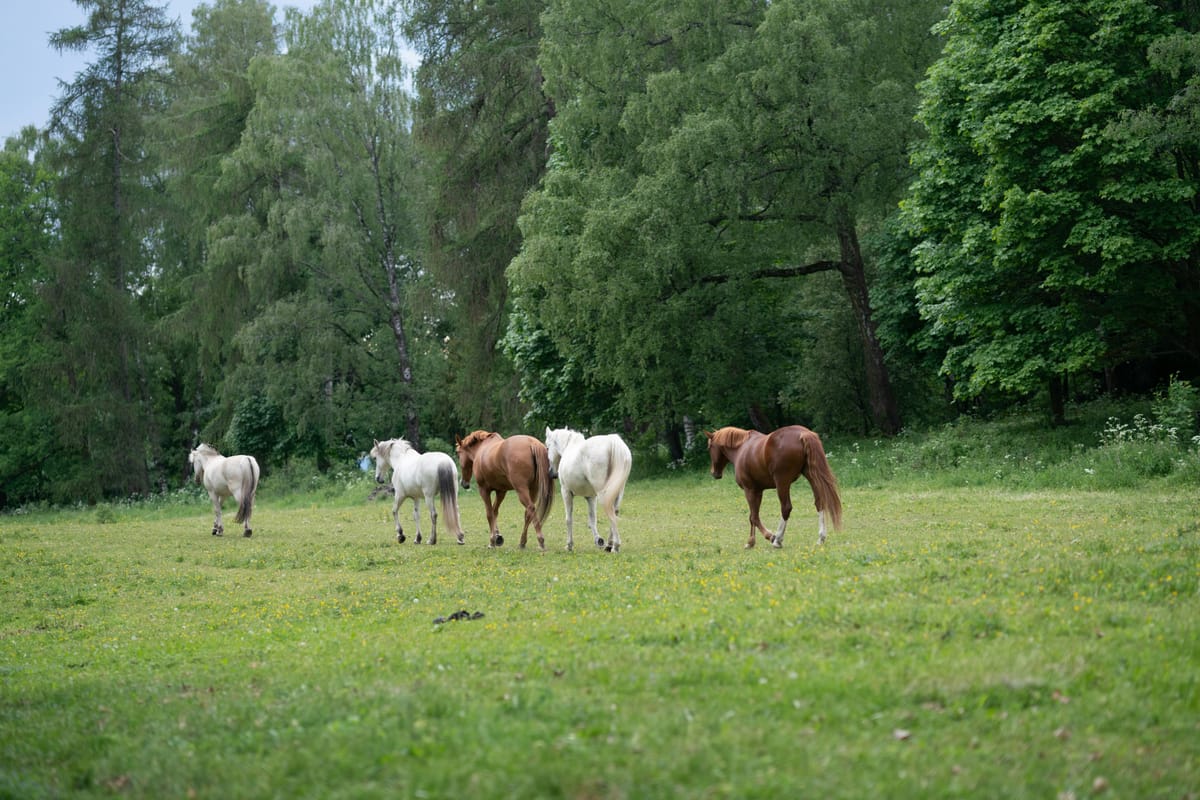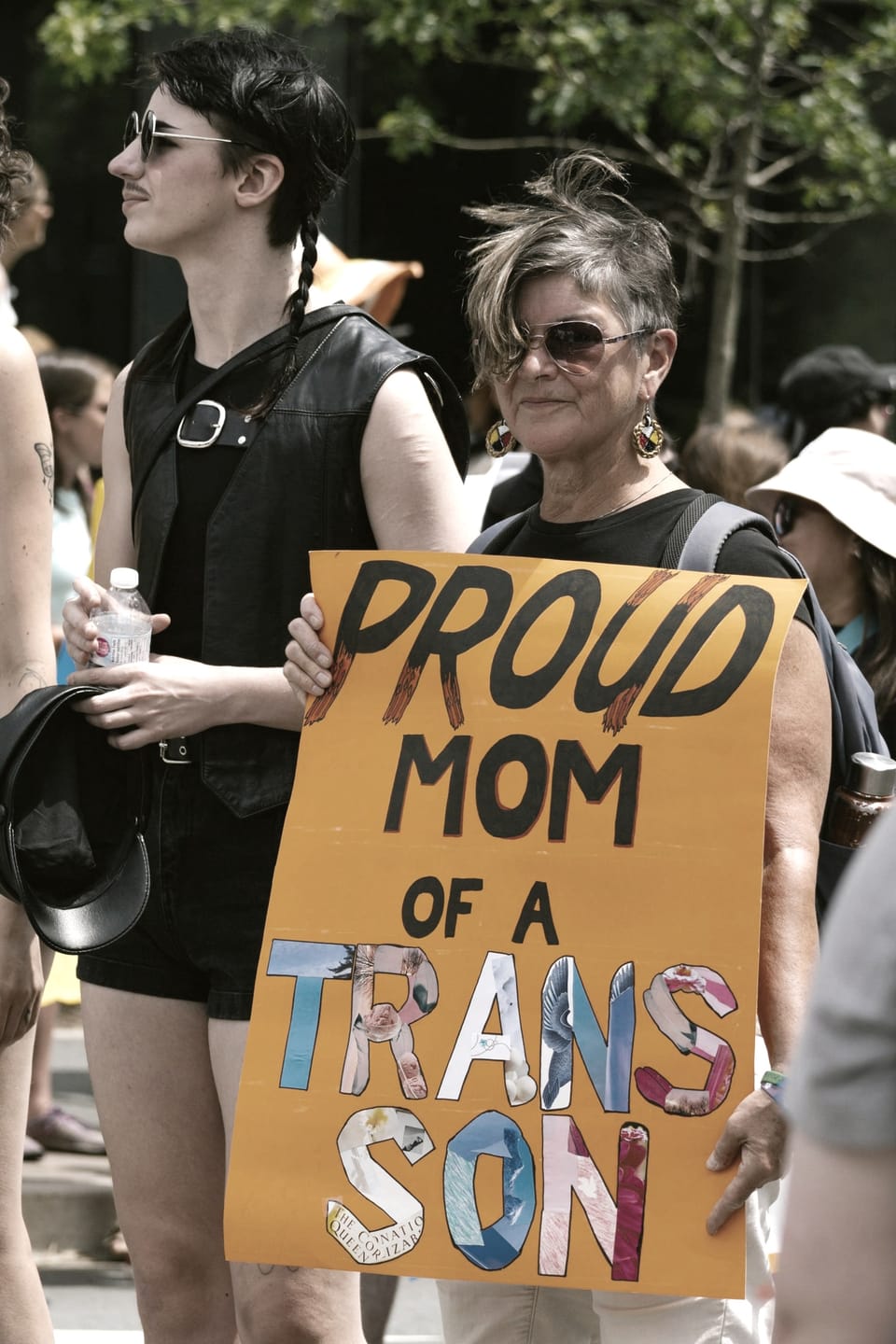Headspace in a Red State: Guest writer Ashley Musselwhite
Moving a gay teen out of the city might seem counterintuitive. But in rural Kentucky, my gender nonconforming child found peace, and her true self

I have the pleasure in this life of raising a gay, gender nonconforming teen (pronouns: she/them) in a very red, southern state. At least, that’s the first thing people who’ve likely never even visited Kentucky think about Kentucky. We’re known for racehorses, bourbon, and, colloquially, a lack of footwear and a fondness for first cousins. We are not well known for progressive politics—which can be said for most of The South outside of a few cities here and there. Louisville is not one of those cities.

For most of my child’s life, we resided in Louisville proper. Right now we live on the outskirts, surrounded by horse farms and McMansions—the “we” here consisting of my 15-year-old daughter, myself (mid-40s, single mother), and two cats. I work remotely, which means I work from home, and I often catch myself gazing off at the horses outside my window instead of paying attention to the meetings on the screen in front of me. Most weekdays, I drive 20+ miles into Louisville to pick up or drop off my kid, who still attends school in the city. Inconvenient, I know. But country life has its advantages.

Two years ago, prior to moving outside of Louisville, my child and I had been through a series of events that left both of us feeling as if the ground had vanished below our feet: family tragedies that included a beloved cousin—who was, notably, trans—taking their own life; my decision to end an abusive 10-year relationship with my ex; pulling the plug on some old friendships; and, finally, changing jobs and changing schools. A real tower moment, as the tarot might say.
Moving to the country was, I now realize, exactly what we needed at the time, both practically and metaphorically.
Comfortable quiet
It may seem counterintuitive to take a gay teen from the city and move them to the country. Especially in a state that has become hostile to gay and trans kids. But let me, for a moment, mess with the pervasive stereotypes about Kentucky in particular and rural areas in general.
One of the most important things I learned about my child, back during Covid-times, was to take a fairly hands-off approach to her and her schoolwork. In 2020, as the doors of schools were closing across the world, everyone scrambling to figure out how to educate kids online, it became clear very quickly that my kid did their best work when they were just given the assignments and left to their own devices.
I didn’t concern myself with whether they were reading the passages for social studies or swinging in the hammock chairs in the backyard. I also had my own work to focus on, after all. This resulted in long stretches of time where we were circling each other’s physical vicinities without exchanging words, available to each other without interaction, amid lots of comfortable quiet. Ample headspace.
I talk a lot about needing ample headspace, and I’m not referring to the headspace in my Subaru, but rather the capacity to think in an unstructured, maybe aimless fashion. To just wonder and ponder and process.
My child had spent the previous years miserable in public middle school, plagued by the common problems of teachers misgendering them and petty cliquishness. So for their 8th grade year, I pulled them out of public school, opting to homeschool. And I feel incredibly lucky to have made it work, although looking back, I’m not even sure how I did.
Surprise
At the time of our tower moment and subsequent move, my kid identified as genderfluid and was getting hormone blockers through the pediatric gender clinic at Louisville’s main children’s hospital. Toward the end of that school year, we had a routine appointment at the clinic for my child’s hormone injection. We drove the road that runs along the river into the city, singing Carly Simon and cracking jokes. We parked, went into the hospital, rode the elevator to the clinic, and waited to be called back to the nurse’s station.
By then we had been going for injections for a year, first monthly, then every three months, and we knew most of the staff. The nurse who saw us that day was one we’d seen many times before. She opened the conversation by joking about preferred injection sites (thigh or arm), and my teen said, in the most nonchalant manner, “I don’t think I want to take blockers anymore.”
We all looked at each other for a moment, surprised. “You couldn’t have told me before we left the house?” I said, and then, “are you sure?” And that was basically that.
The nurse reiterated that the injections would stay in the office until they expired, in case we changed our minds, but that was our last visit. Over the following months, I made it a point to ask my kid how they felt in their body, especially with all the changes of puberty returning, and though they didn’t always view the hormone homecoming as welcome, they didn’t change their mind on it again.
Trust
My point here is that we all need the space to explore our thoughts and discover our selves. And we don’t need anyone else to do it for us. Through exploring the nuances of gender and knowing they would be supported, whatever decision they made, my daughter came to her own conclusions. Our trust in teens to make such decisions on their own is vital for their mental health and crucial for their identity formation. In short, no one can tell you who you are: you have to find out yourself.
Our trust in teens to make such decisions on their own is vital for their mental health and crucial for their identity formation.
In the time between my teen making their decision to not receive puberty blockers and this writing, Kentucky banned gender affirming care for trans youth.
It’s almost impossible to say how depressing this is to me—that options available to us just a year ago are no longer on the table. We know multiple families who regularly travel out of state to access care they could have received in their home city only recently. But I don’t feel in any way surprised at this turn of events, following as they do the same legislative patterns practiced across the bible belt—first chipping away at women’s reproductive rights, then moving targets onto LGBTQ+ children.
I no longer homeschool my daughter. As 9th grade approached, their mental health was much improved, owing partly to our move to the country, and they were ready to return to the classroom. I should note that I had to do a lot of legwork when choosing my daughter’s new school, given how legislative mandates would have indirectly resulted in her being bullied for being nonconforming and queer. The truth is, I’ve had to hustle several jobs at once in order to afford tuition for a private school where I know she is safe.
Profound importance
I hear people describe our current moment as a historical backswing, a reactionary attempt to quell social progress, but one that will eventually right itself in the appropriate direction. Setting aside any semantics on which direction is appropriate, or the definitions and judgements of progress, the fact remains that our ability to make decisions about our own and our children’s lives—decisions of profound importance—is rapidly being taken away from us.
Growing up, I lived in many places before my family settled in Louisville. Nonetheless, Louisville is my home. It’s important for people in blue states to understand there are just as many queer and gender nonconforming people in southern states as there are in yours. And that, yes, we are suffering due to hateful anti-trans legislation, so much so that we are forced to consider leaving home. Which in itself is incredibly painful.
But for now, I’m staying put. Living in the country has its advantages, my favorite being how the openness of the landscape allows for an openness of thought.
I hope that we can all find ample headspace, that comfortable quiet in which we might be reminded of our self direction and self determination.
* * *
Ashley Musselwhite is a writer, activist, and mother who resides in the outskirts of Louisville, Kentucky, with her daughter.



